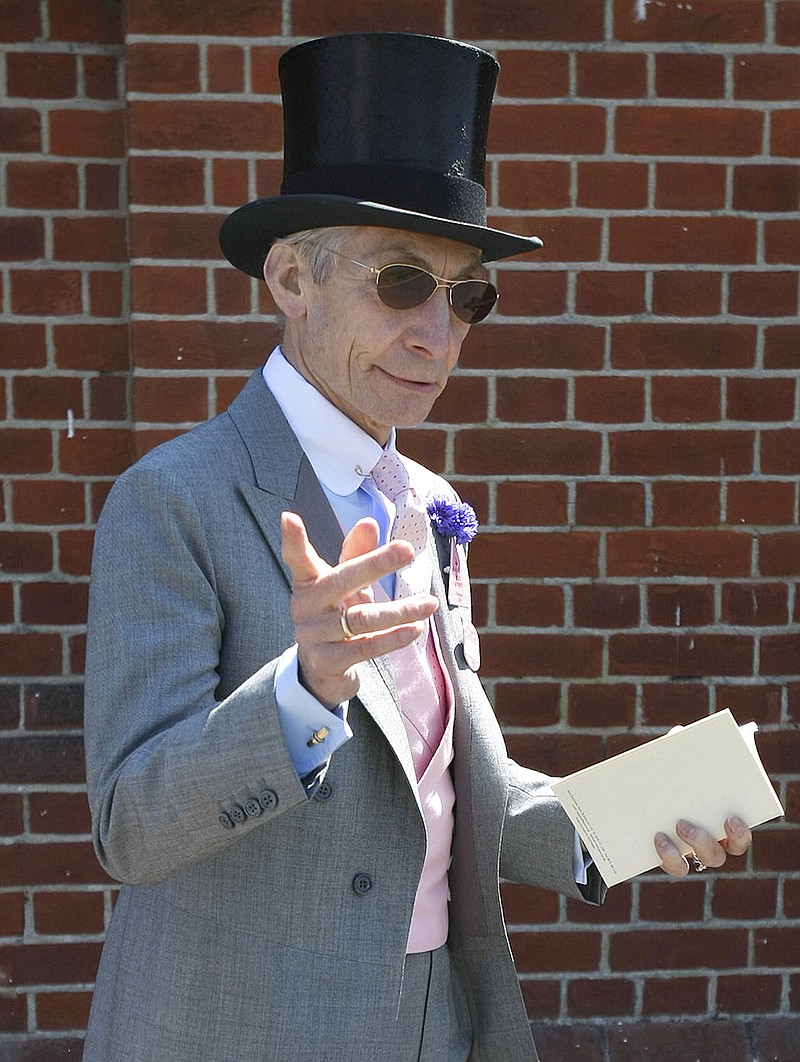LONDON -- Charlie Watts, the self-effacing and unshakeable Rolling Stones drummer who helped anchor one of rock's greatest rhythm sections and used his "day job" to support his enduring love of jazz, has died, according to his publicist. He was 80.
Bernard Doherty said Tuesday that Watts "passed away peacefully in a London hospital earlier today surrounded by his family."
"Charlie was a cherished husband, father and grandfather and also as a member of The Rolling Stones, one of the greatest drummers of his generation," Doherty said.
[Video not showing up above? Click here to watch » https://www.youtube.com/watch?v=21ZgrcHbusE]
Watts had announced that he would not tour with the Stones in 2021 because of an undefined health issue.
The quiet, elegantly dressed Watts often was ranked with Keith Moon, Ginger Baker and a handful of others as a premier rock drummer, respected worldwide for his muscular, swinging style as the Stones rose from their scruffy beginnings to international superstardom. He joined the band early in 1963 and remained for almost 60 years, ranked just behind Mick Jagger and Keith Richards as the group's longest-lasting and most essential member.
Watts stayed on, and largely held himself apart, through the drug abuse, creative clashes and ego wars that helped kill founding member Brian Jones, drove bassist Bill Wyman and Jones' replacement Mick Taylor to quit and otherwise made being in the Stones the most exhausting of jobs.
A classic Stones song like "Brown Sugar" and "Start Me Up" often began with a hard guitar riff from Richards, with Watts following closely behind, and Wyman, as the bassist liked to say, "fattening the sound." Watts' speed, power and time keeping were never better showcased than during the concert documentary, "Shine a Light," when director Martin Scorsese filmed "Jumpin' Jack Flash" from where he drummed toward the back of the stage.
Watts didn't care for flashy solos or attention of any kind, but with Wyman and Richards forged some of rock's deepest grooves on "Honky Tonk Women," "Brown Sugar" and other songs. The drummer adapted well to everything from the disco of "Miss You" to the jazzy "Can't You Hear Me Knocking" and the dreamy ballad "Moonlight Mile."
The Stones began, Watts said, "as white blokes from England playing Black American music" but quickly evolved to have their own distinctive sound. Watts was a jazz drummer in his early years and never lost his affinity for the music he first loved, returning to it during the long breaks between Stones tours.
Charles Robert Watts, son of a truck driver and a homemaker, was born in Neasden, London, on June 2, 1941. From childhood, he was passionate about music -- falling in love with the drums after hearing Chico Hamilton and teaching himself to play by listening to records by jazz giants like Johnny Dodds, Charlie Parker and Duke Ellington.
Watts' career took off after he played with Alexis Korner's Blues Incorporated, for whom Jagger also performed, and was encouraged by Korner to join the Stones.
Watts wasn't a rock music fan but was guided by Richards and Brian Jones as he absorbed blues and rock records. He said the band could trace its roots to a brief period when he had lost his job and shared an apartment with Jagger and Richards because he could live there rent-free.
Watts was the final man to join the Stones; the band had searched for months to find a permanent drummer and feared Watts was too accomplished for them. Richards recalled the band wanting him so badly to join that members cut down on expenses so they could afford to pay Watts a proper salary.
"Every band I'd ever been in had lasted a week," Watts said. "I always thought the Stones would last a week, then a fortnight, and then suddenly, it's 30 years."
He found refuge from the rock life, marrying Shirley Ann Shepherd in 1964 and having a daughter, Seraphina, soon after. While other famous rock marriages crumbled, theirs held.
Watts generally resisted the excesses of his band mates, but fell into heroin addiction in the mid-1980s. He credited his stable relationship with his wife for getting him off drugs.
With his financial future secure because of the Stones' status, Watts was able to indulge his passion for jazz by putting together some of the most talented players in Britain for a series of recordings and performances.
His first jazz disc was 1986's "Live at Fulham Town Hall" by the Charlie Watts Orchestra. Others by the Charlie Watts Quintet followed, and he then expanded that group into the Charlie Watts and the Tentet.
Watts was stricken with throat cancer in 2004. After extensive treatment he made a full recovery and resumed touring with both the Stones and his jazz band.
By then, he'd evolved into a craggy, white-haired, impeccably dressed senior statesman of rock. It was not unusual to see him wearing a custom-made suit and polka dot tie while his band mates wore grungy jeans and T-shirts.
In the tumultuous, extremely competitive world of rock and roll, Watts seemed to make few enemies.
"It all seems to boil down to a certain quality which is as rare as hen's teeth in the music business, but which Charlie Watts is perceived to have in abundance. In a word, decency," columnist Barbara Ellen wrote after interviewing Watts in 2000. "You've got to hand it to a ... man who's played with the world's most influential rock 'n' roll band ... and stayed happily married to his wife, Shirley. ... A man who, moreover, remains resolutely determined not to take his elevated position too seriously."
Information for this article was contributed by Janelle Stecklein of The Associated Press. Katz contributed information for this article before his death.


